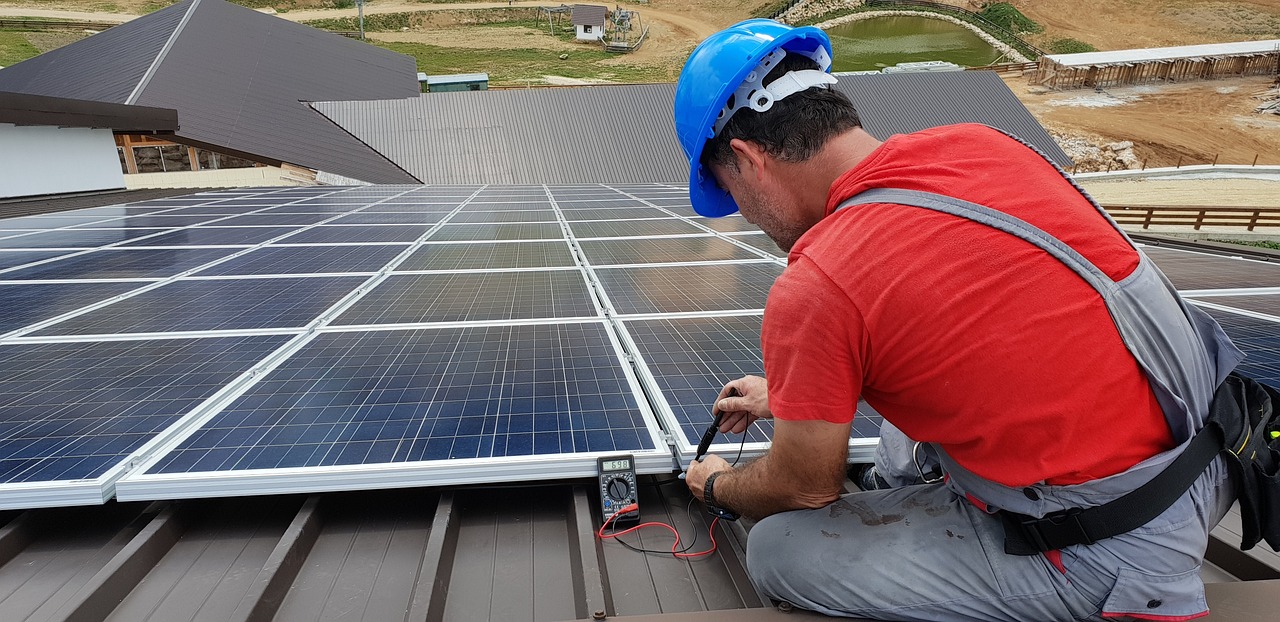비즈니스를위한 태양 에너지: 비용 절감 및 탄소 발자국
오늘날의 비즈니스 환경에서는, 지속가능성은 더 이상 유행어가 아니다; 그것은 전략적으로 꼭 필요한 일이다. 에너지 비용이 상승하면서, 환경 규제 증가, 기업의 사회적 책임에 대한 헌신이 점점 더 커지고 있습니다., 점점 더 많은 기업들이 비용을 절감하고 탄소 배출량을 줄이기 위한 수단으로 태양 에너지로 전환하고 있습니다.. 이 기사에서는, 태양 에너지가 어떻게 기업의 판도를 바꿀 수 있는지 알아보겠습니다., 재정적 이익을 제공하는 동시에 보다 푸른 미래에 기여합니다..

경제적 이점
기업이 태양 에너지를 채택하는 가장 강력한 이유 중 하나는 운영 비용을 크게 절감할 수 있는 잠재력입니다.. 태양으로부터 전기를 생산함으로써, 기업은 에너지 비용을 절감할 수 있으며, 어떤 경우에는, 심지어 잉여 에너지를 전력망에 다시 판매하기도 합니다.. 태양광 발전은 안정적이고 예측 가능한 전력 공급원을 제공합니다., 화석 연료 가격의 변동성으로부터 기업을 보호합니다..

환경에 미치는 영향
태양 에너지를 채택하는 기업은 재정적 보상을 얻을 뿐만 아니라 환경에도 긍정적인 영향을 미칩니다.. 태양광발전은 깨끗하다, 운영 중 온실가스 배출이 없는 재생에너지원. 화석 연료에 대한 의존을 줄임으로써, 기업은 기후 변화에 대처하고 탄소 배출량을 줄이는 데 도움을 줄 수 있습니다.. 지속 가능성에 대한 이러한 약속은 회사의 명성을 높이고 환경을 생각하는 소비자에게 매력을 줄 수 있습니다..

투자 수익 (ROI)
태양 에너지에 투자하는 것은 단지 환경을 고려한 결정이 아닙니다.; 현명한 금전적 조치다. 태양광 패널은 수명이 길다, 종종 초과합니다 25 연령, 최소한의 유지 관리만 필요. 태양광 설치에 대한 초기 투자는 일반적으로 몇 년 내에 에너지 절약과 잠재적인 세금 인센티브를 통해 회수됩니다., 상당한 장기적 비용 절감으로 이어짐.
에너지 독립
태양 에너지는 기업에 어느 정도 에너지 독립성을 제공합니다.. 현장에서 전력을 생산하여, 기업은 외부 에너지원과 전력망에 대한 의존도가 낮아집니다.. 이러한 탄력성은 에너지 공급 중단이나 전력망 장애 시 특히 유용할 수 있습니다., 비즈니스 연속성과 중단 없는 운영 보장.
정부 인센티브
많은 정부는 기업의 태양 에너지 채택을 장려하기 위해 인센티브와 보조금을 제공합니다.. 이러한 인센티브는 세금 공제의 형태를 취할 수 있습니다., 보조금, 또는 유리한 금융 옵션, 태양광 설치를 기업에게 재정적으로 더욱 매력적으로 만듭니다.. 기업이 이러한 기회를 탐색하고 사용 가능한 프로그램을 활용하는 것이 중요합니다..
기술 발전
태양광 산업은 계속 발전하고 있다, 지속적인 기술 발전으로 효율성과 비용 효율성이 향상됨. 태양광 패널 신소재, 에너지 저장 솔루션, 스마트 그리드 기술은 태양 에너지 시스템의 성능과 다양성을 지속적으로 개선하고 있습니다., 기업을 위한 가치 제안을 더욱 강화합니다..
결론
태양 에너지를 사업 운영에 통합하는 것은 재정적 이익과 환경 관리를 조화시키는 미래 지향적인 전략입니다.. 비용 절감으로, 탄소 발자국 감소, 그리고 지속 가능성을 포용, 기업은 끊임없이 진화하는 시장에서 성장하는 동시에 보다 깨끗하고 지속 가능한 미래에 기여할 수 있습니다.. 태양에너지는 단순한 기업의 선택이 아니다; 이는 더 밝고 환경적으로 책임감 있는 내일을 향한 길입니다.

과제에 대한 정확한 설명으로 모든 것이 매우 개방적입니다.. 정말 유익했어요. 귀하의 웹사이트가 유용합니다. 공유해주셔서 감사합니다!